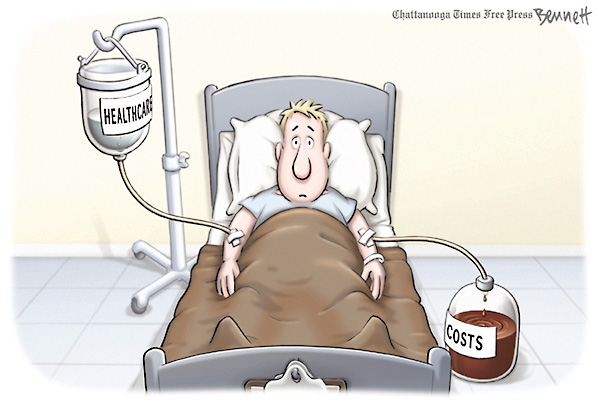Share this
 Wednesday, 06 April 2011 04:42
Wednesday, 06 April 2011 04:42
From Dean Baker’s blog Beat The Press at The Center for Budget and Policy Research:
“Rep. Ryan Proposes Medicare Plan Under Which Seniors Would Pay Most of Their Income for Health Care”
That is what headlines would look like if the United States had an independent press. After all, this is one of the main take aways of the Congressional Budget Office’s (CBO) analysis of the plan proposed by Representative Paul Ryan, the Republican chairman of the House Budget Committee. Representative Ryan would replace the current Medicare program with a voucher for people who turn age 65 in 2022 and later. This voucher would be worth $8,000 in for someone turning age 65 in that year. It would rise in step with with the consumer price index and also as people age. (Health care expenses are higher for people age 75 than age 65.)
According to the CBO analysis the benefit would cover 32 percent of the cost of a health insurance package equivalent to the current Medicare benefit (Figure 1). This means that the beneficiary would pay 68 percent of the cost of this package. Using the CBO assumption of 2.5 percent annual inflation, the voucher would have grown to $9,750 by 2030. This means that a Medicare type plan for someone age 65 would be $30,460 under Representative Ryan’s plan, leaving seniors with a bill of $20,700. (This does not count various out of pocket medical expenditures not covered by Medicare.)
According to the Social Security trustees, the benefit for a medium wage earner who first starts collecting benefits at age 65 in 2030 would be $32,200. (This adjusts the benefit projected by the Social Security trustees [$19,652 in 2010 dollars] for the 2.5 percent annual inflation rate assumed by CBO.) For close to 70 percent of seniors, Social Security is more than half of their retirement income. Most seniors will get a benefit that is less than the medium earners benefit described here since their average earnings are less than that of a medium earner and they start collecting Social Security benefits before age 65.
Furthermore, the portion of income going to health care costs will increase through time according to the CBO analysis. This is due both to aging of individuals and to increasing health care costs through time. As noted insurance for older beneficiaries will cost more than insurance for younger beneficiaries, but Representative Ryan’s voucher would still only pay the same amount for their care. This means that if the average 80-year-old cost twice as much to insure as the average 65-year-old, then the premium that would come out of a seniors’ pocket would be twice as large. This implies that if the program had been in effect for 15 years in 2030 then the average senior would be paying $41,400 for a Medicare equivalent insurance package in 2030, 25 percent more than the medium earner’s benefit in that year.
The other reason that Representative Ryan’s plan will lead to rising health care costs for seniors through time is that the voucher payment does not keep pace with health care cost inflation. As costs continue to rise relative to the voucher, seniors will be required to pay a larger portion of their health care costs themselves. It is worth noting that 2030 is only 8 years after the voucher program kicks in.
Share this
Contact Us
Have questions? Send us a private message using the form below.

